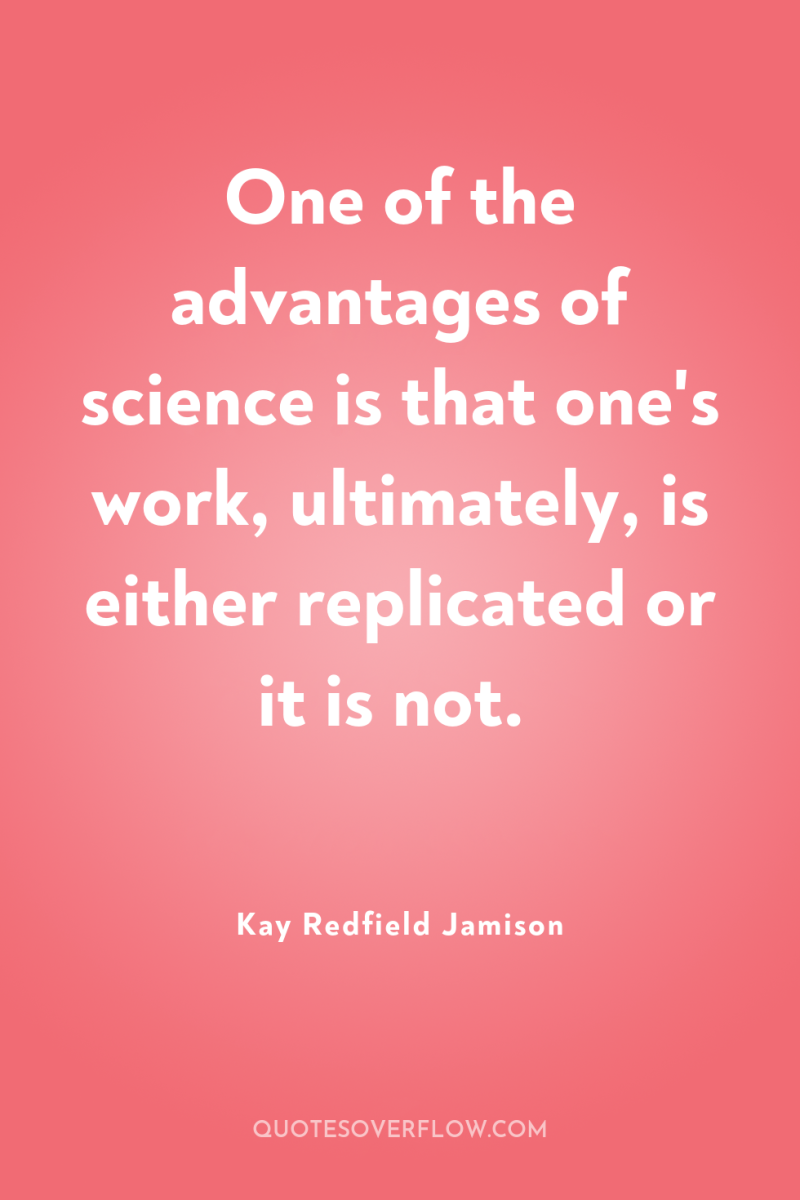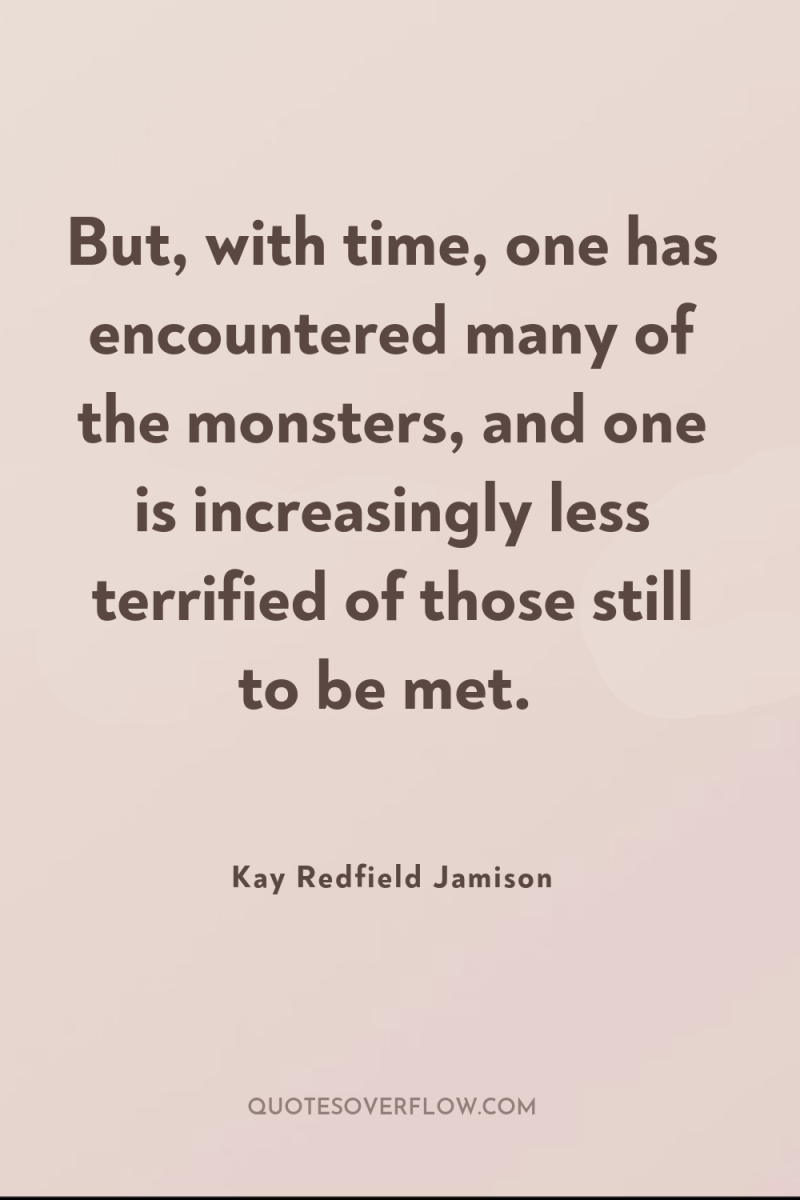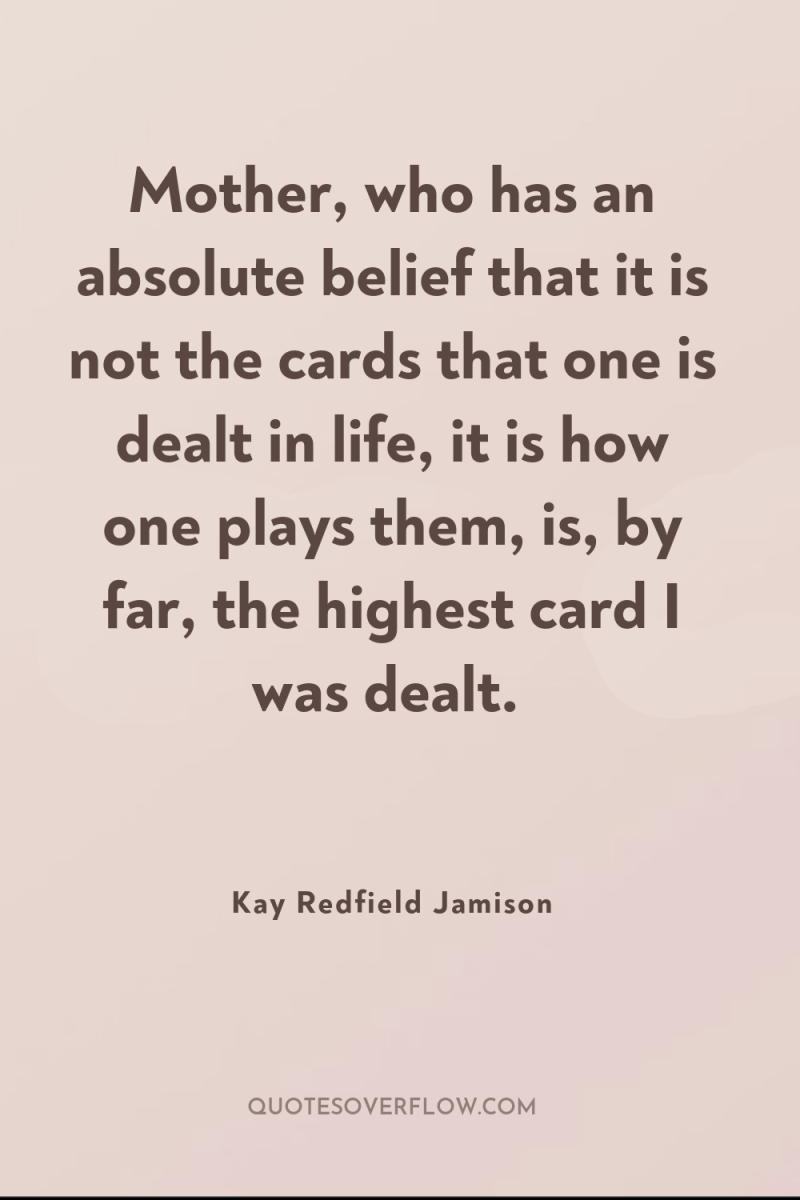1
We all build internal sea walls to keep at bay the sadnesses of life and the often overwhelming forces within our minds. In whatever way we do this–through love, work, family, faith, friends, denial, alcohol, drugs, or medication–we build these walls, stone by stone, over a lifetime. One of the most difficult problems is to construct these barriers of such a height and strength that one has a true harbor, a sanctuary away from crippling turmoil and pain, but yet low enough, and permeable enough, to let in fresh seawater that will fend off the inevitable inclination toward brackishness.Kay Redfield Jamison
2
I decided early in graduate school that I needed to do something about my moods. It quickly came down to a choice between seeing a psychiatrist or buying a horse. Since almost everyone I knew was seeing a psychiatrist, and since I had an absolute belief that I should be able to handle my own problems, I naturally bought a horse.Kay Redfield Jamison

3
One of the advantages of science is that one's work, ultimately, is either replicated or it is not.Kay Redfield Jamison

4
But, with time, one has encountered many of the monsters, and one is increasingly less terrified of those still to be met.Kay Redfield Jamison

5
Mother, who has an absolute belief that it is not the cards that one is dealt in life, it is how one plays them, is, by far, the highest card I was dealt.Kay Redfield Jamison
6
There is a particular kind of pain, elation, loneliness, and terror involved in this kind of madness. When you're high it's tremendous. The ideas and feelings are fast and frequent like shooting stars, and you follow them until you find better and brighter ones. Shyness goes, the right words and gestures are suddenly there, the power to captivate others a felt certainty. There are interests found in uninteresting people. Sensuality is pervasive and the desire to seduce and be seduced irresistible. Feelings of ease, intensity, power, well-being, financial omnipotence, and euphoria pervade one's marrow. But, somewhere, this changes. The fast ideas are far too fast, and there are far too many; overwhelming confusion replaces clarity. Memory goes. Humor and absorption on friends' faces are replaced by fear and concern. Everything previously moving with the grain is now against-- you are irritable, angry, frightened, uncontrollable, and enmeshed totally in the blackest caves of the mind. You never knew those caves were there. It will never end, for madness carves its own reality.Kay Redfield Jamison
7
I compare myself with my former self, not with others. Not only that, I tend to compare my current self with the best I have been, which is when I have been midly manic. When I am my present "normal" self, I am far removed from when I have been my liveliest, most productive, most intense, most outgoing and effervescent. In short, for myself, I am a hard act to follow.Kay Redfield Jamison
8
Her parents, she said, has put a pinball machine inside her head when she was five years old. The red balls told her when she should laugh, the blue ones when she should be silent and keep away from other people; the green balls told her that she should start multiplying by three. Every few days a silver ball would make its way through the pins of the machine. At this point her head turned and she stared at me; I assumed she was checking to see if I was still listening. I was, of course. How could one not? The whole thing was bizarre but riveting. I asked her, What does the silver ball mean? She looked at me intently, and then everything went dead in her eyes. She stared off into space, caught up in some internal world. I never found out what the silver ball meant.Kay Redfield Jamison
9
Others imply that they know what it is like to be depressed because they have gone through a divorce, lost a job, or broken up with someone. But these experiences carry with them feelings. Depression, instead, is flat, hollow, and unendurable. It is also tiresome. People cannot abide being around you when you are depressed. They might think that they ought to, and they might even try, but you know and they know that you are tedious beyond belief: you are irritable and paranoid and humorless and lifeless and critical and demanding and no reassurance is ever enough. You're frightened, and you're frightening, and you're "not at all like yourself but will be soon, " but you know you won't. .Kay Redfield Jamison
10
If I can't feel, if I can't move, if I can't think, and I can't care, then what conceivable point is there in living?Kay Redfield Jamison
11
No amount of love can cure madness or unblacken one's dark moods. Love can help, it can make the pain more tolerable, but, always, one is beholden to medication that may or may not always work and may or may not be bearableKay Redfield Jamison
12
We all build internal sea walls to keep at bay the sadnesses of life and the often overwhelming forces within our minds. In whatever way we do this--through love, work, family, faith, friends, denial, alcohol, drugs, or medication, we build these walls, stone by stone, over a lifetime.Kay Redfield Jamison
13
No pill can help me deal with the problem of not wanting to take pills; likewise, no amount of psychotherapy alone can prevent my manias and depressions. I need both. It is an odd thing, owing life to pills, one's own quirks and tenacities, and this unique, strange, and ultimately profound relationship called psychotherapyKay Redfield Jamison
14
Somehow, like so many people who get depressed, we felt our depressions were more complicated and existentially based than they actually were.Kay Redfield Jamison
15
When I am high I couldn’t worry about money if I tried. So I don’t. The money will come from somewhere; I am entitled; God will provide. Credit cards are disastrous, personal checks worse. Unfortunately, for manics anyway, mania is a natural extension of the economy. What with credit cards and bank accounts there is little beyond reach. So I bought twelve snakebite kits, with a sense of urgency and importance. I bought precious stones, elegant and unnecessary furniture, three watches within an hour of one another (in the Rolex rather than Timex class: champagne tastes bubble to the surface, are the surface, in mania), and totally inappropriate sirenlike clothes. During one spree in London I spent several hundred pounds on books having titles or covers that somehow caught my fancy: books on the natural history of the mole, twenty sundry Penguin books because I thought it could be nice if the penguins could form a colony. Once I think I shoplifted a blouse because I could not wait a minute longer for the woman-with-molasses feet in front of me in line. Or maybe I just thought about shoplifting, I don’t remember, I was totally confused. I imagine I must have spent far more than thirty thousand dollars during my two major manic episodes, and God only knows how much more during my frequent milder manias. But then back on lithium and rotating on the planet at the same pace as everyone else, you find your credit is decimated, your mortification complete: mania is not a luxury one can easily afford. It is devastating to have the illness and aggravating to have to pay for medications, blood tests, and psychotherapy. They, at least, are partially deductible. But money spent while manic doesn’t fit into the Internal Revenue Service concept of medical expense or business loss. So after mania, when most depressed, you’re given excellent reason to be even more so.Kay Redfield Jamison
16
When both she and I had to deal with our respective demons, my sister saw the darkness as being within and part of herself, the family and the world. I, instead, saw it as a stranger; however lodged within my mind and soul the darkness became, it almost always seemed an outside force that was at war with my natural self.Kay Redfield Jamison
17
God only knew what ran underneath the fierce self-discipline and emotional control that had come with my upbringing. But the cracks were there, I knew it, and they frightened me.Kay Redfield Jamison
18
Depression, somehow, is much more in line with society's notions of what women are all about: passive, sensitive, hopeless, helpless, stricken, dependent, confused, rather tiresome, and with limited aspirations. Manic states, on the other hand, seem to be more the provenance of men: restless, fiery, aggressive, volatile, energetic, risk taking, grandiose and visionary, and impatient with the status quo. Anger or irritability in men, under such circumstances, is more tolerated and understandable; leaders or takers of voyages are permitted a wider latitude for being temperamental. Journalists and other writers, quite understandably, have tended to focus on women and depression, rather than women and mania. This is not surprising: depression is twice as common in women as men. But manic-depressive illness occurs equally often in women and men, and, being a relatively common condition, mania ends up affecting a large number of women. They, in turn, often are misdiagnosed, receive poor, if any, psychiatric treatment, and are at high risk for suicide, alcoholism, drug abuse, and violence. But they, like men who have manic-depressive illness, also often contribute a great deal of energy, fire, enthusiasm, and imagination to the people and world around them.Kay Redfield Jamison
19
It took me far too long to realize that lost years and relationships cannot be recovered. That damage done to oneself and others cannot always be put right again.Kay Redfield Jamison
20
I long ago abandoned the notion of a life without storms, or a world without dry and killing seasons. Life is too complicated, too constantly changing, to be anything but what it is. And I am, by nature, too mercurial to be anything but deeply wary of the grave unnaturalness involved in any attempt to exert too much control over essentially uncontrollable forces. There will always be propelling, disturbing elements, and they will be there until, as Lowell put it, the watch is taken from the wrist. It is, at the end of the day, the individual moments of restlessness, of bleakness, of strong persuasions and maddened enthusiasms, that inform one’s life, change the nature and direction of one’s work, and give final meaning and color to one’s loves and friendships.Kay Redfield Jamison
21
Far too many doctors-many of them excellent physicians-commit suicide each year; one recent study concluded that, until quite recently, the United States lost annually the equivalent of a medium-sized medical school class from suicide alone. Most physician suicides are due to depression or manic-depressive illness, both of which are eminently treatable. Physicians, unfortunately, not only suffer from a higher rate of mood disorders than the general population, they also have a greater access to very effective means of suicide.Kay Redfield Jamison
22
But money spent while manic doesn't fit into the Internal Revenue Service concept of medical expense or business loss. So after mania, when most depressed, you're given excellent reason to be even more so.Kay Redfield Jamison
23
Once a restless or frayed mood has turned to anger, or violence, or psychosis, Richard, like most, finds it very difficult to see it as illness, rather than being willful, angry, irrational or simply tiresome.Kay Redfield Jamison
24
Composure and self-restraint were not only desirable characteristics in a woman, they were essental. As my mother put it later, it was bad enough having to worry yourself sick every time your husband went up in an airplane; now, she was being told, she was also supposed to feel responsible if his plane crashed. Anger and discontent, lest they kill, were to be kept to oneself. The military, even more so than the rest of society, clearly put a premium on well-behaved, genteel, and even-tempered women. .Kay Redfield Jamison
25
He thought of women in terms of breasts, not minds, and it always seemed to irritate him that most women had both.Kay Redfield Jamison